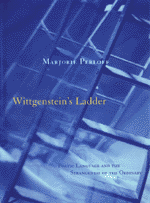
Wittgenstein's Ladder:
Poetic Language and the Strangeness of the Ordinary
Marjorie Perloff
Click Here to Read the Introductory
Chapter from Wittgenstein's Ladder
"My propositions are elucidatory in this
way: he who understands me finally recognizes them as senseless, when he
has climbed out through them, on them, over them. (He must so to speak throw
away the ladder, after he has climbed up on it.)"
Austere and uncompromising, the philosopher Ludwig Wittgenstein
had no use for the avant-garde art works of his own time. He refused to
formulate an aesthetic, declaring that one can no more define the "beautiful"
than determine "what sort of coffee tastes good." And yet many
of the writers of our time have understood, as academic theorists generally
have not, that Wittgenstein is "their" philosopher. How do we
resolve this paradox? Marjorie Perloff, our foremost critic of twentieth-century
poetry, argues that Wittgenstein has provided writers with a radical new
aesthetic, a key to recognizing the inescapable strangeness of ordinary
language.
Wittgenstein's ladder is an apt figure for this radical aesthetic, and not
just in its ordinariness as an object. The movement "up" this
ladder can never be more than what--Wittgenstein's contemporary, Gertrude
Stein, called "Beginning again and again." Wittgenstein shows
us, too, that we cannot climb the same ladder twice: the use of language,
the context in which words and sentences appear, defines their meaning,
which changes with every repetition. Wittgenstein's aesthetic brooks no
theory, no essentialism, no metalanguage---only a practice, a mode of operation,
fragmentary and elliptical.
Taking seriously Wittgenstein's remark that "philosophy ought really
to be written only as a form of poetry," Perloff begins by discussing
Wittgenstein the "poet." She examines two of his works, the Tractatus
and the Investigations, less from the standpoint of what they say than of
what they are--radically poetic works that exemplify a practice through
which grammar becomes the focus of attention. Wittgenstein's obsession with
the working of language, Perloff argues, is an index to his particular form
of marginality -- national, cultural, religious, sexual -- a marginality
that is perhaps representative of the modernist condition.
Perloff turns next to such consciously or unconsciously Wittgensteinian
writers as Gertrude Stein, Samuel Beckett, the Viennese postwar writers
Ingeborg Bachmann and Thomas Bernhard, and contemporary American language
poets from Robert Creeley and Ron Silliman to Rosmarie Waldrop and Lyn Hejinian.
Wittgenstein, Perloff argues, provides us with a "ladder" whereby
we may see that the seemingly opaque language forms of Stein or Hejinian,
Beckett or Bernhard, can make perfectly good "sense" when we learn,
so to speak, how not to read them. Wittgenstein's stringent interrogation
of language as cultural and social practice--"the limits of my language
mean the limits of my world"--has provided an especially crucial paradigm
for the new experimental poetics, all the while transforming our reading
and viewing habits as well.
Perloff ends with a coda on an artist's book produced explicitly as a "commentary"
on Wittgenstein's aesthetic: Joseph Kosuth's Letters from Wittgenstein,
Abridged at Ghent. Here it is photography, embedded in writing, that
becomes "philosophy." And what we learn is that the poetics of
everyday life--inherent as it is in our demotic culture--is anything but
banal. Marjorie Perloff is the Sadie Dernham Patek Professor of Humanities
at Stanford University. She is the author of many books, most recently Radical
Artifice: Writing Poetry in the Age of Media, published by the University
of Chicago Press.
Praise for Marjorie Perloff:
"Poets and general readers alike have good reason to be grateful to
Perloff, a critic not only superbly well-informed, not only skilled in communication,
but also fun to read. I imagine that the most haughtily arcane of the poets
will acknowledge the patient intelligence she brings to her reading of their
work, and that the most resistant of readers will respond to her clear and
lively prose."
--Frank Kermode
Advance Praise for Wittgenstein's
Ladder:
"Wittgenstein proposed to use ordinary language for philosophy, Gertrude
Stein used ordinary language for poetry. The implications of these decisions
are what
Perloff explores brilliantly."
--Guy Davenport
"In liberating Wittgenstein from the confines of sterile analytical
debates among 'language philosophers' Perloff has managed a kind of 'debut'
in which Wittgenstein, for the first time, can be seen and appreciated as
a creative thinker whose writings straddle the divide of literary and philosophic
composition."
--Herman Rapaport
Fall 1996
University of Chicago Press
248 pages, $27.95 [Hardbound]
ISBN: 0-226-6608-3
Excerpted from WITTGENSTEIN'S
LADDER: POETIC LANGUAGE AND THE STRANGENESS OF THE ORDINARY, by Marjorie
Perloff published by the University
of Chicago Press. Copyright © 1996 by The University of Chicago.
All rights reserved.
